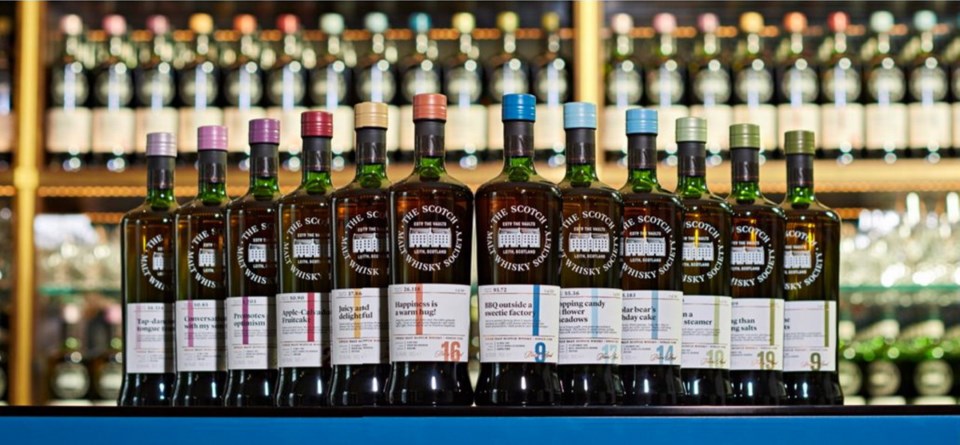In the wake of ‚ÄúProhibition-style‚ÄĚ raids on four B.C. bars last week, people in the hospitality industry are pushing the province to modernize B.C.‚Äôs liquor laws and allow restaurants to buy booze from private liquor stores.
Currently, restaurants must purchase alcohol through the provincially run B.C. Liquor Distribution Branch.
Four bars accused of flouting that rule were raided by government liquor inspectors on Thursday.
Officials from the Liquor Control and Licensing Branch visited the Grand Hotel Nanaimo, the Union Club and Little Jumbo Restaurant in Victoria, and Fets Whisky Kitchen in Vancouver, looking for products from the Scotch Malt Whisky Society, a private club that gives members access to a large selection of single cask, single malt whiskies.
The agents seized 242 bottles of whisky worth about $40,000 from Fets Whisky Kitchen.
Little Jumbo had already pulled the offending whisky from its shelves in January, after another Victoria cocktail bar was subject to intense scrutiny by liquor inspectors, said Little Jumbo’s co-owner Bruce Gillespie.
‚ÄúI think it‚Äôs an out of control, out of touch set of regulations, [enforced by] inspectors who are going by the letter,‚ÄĚ Gillespie said.
The raids coincided with the start of the Victoria Whisky Festival and received much attention from the international suite of whisky writers and bloggers in town.
‚ÄúThe world is laughing at us,‚ÄĚ Gillespie said.
On Monday, B.C. Green Party Leader Andrew Weaver weighed in, saying on Twitter: ‚ÄúIt‚Äôs absolutely outrageous that the B.C. Govt take no steps when there is clear evidence for questionable activity in our real estate sector yet they throw the book at a few folk sampling fine single malts. Someone needs to give their head a shake.‚ÄĚ
Ian Tostenson, CEO of the B.C. Restaurant and Food Services Association, said a group of representatives from restaurants, bars, wineries, craft breweries and distilleries met with Mark Hicken, the government-appointed liquor policy adviser who is gathering information on the industry.
‚ÄúAs part of our submission, we asked the government to consider allowing licensees [restaurants and bars] to buy from the private sector,‚ÄĚ Tostenson said.
Hicken is expected to put forward recommendations by March 31, which could shape the government’s approach to liquor regulation.
Regulations that prevent restaurants and bars from buying liquor anywhere but a government-run liquor outlet are ‚Äúdraconian and backwards,‚ÄĚ said Rod Phillips, former head buyer for Liquor Plus who now runs Liquify, a marketplace for liquor buyers, agents and suppliers.
The government has already collected tax on the product when private liquor stores purchase the alcohol from the Liquor Distribution Branch, he said.
In Alberta, restaurants and bars can purchase from private liquor stores at a wholesale price, rather than the full retail price as required in B.C.
Phillips said it’s likely the raids were spurred by a complaint that was impossible to ignore and aren’t necessarily a signal of tougher liquor enforcement under the NDP government.
‚ÄúThe Liberals had 16 years to modernize the liquor industry,‚ÄĚ Phillips said, adding that the Liberals instituted the current pricing and distribution rules.
In a statement, the Ministry of Attorney General said the Liquor Control and Licensing Branch performs inspections and follows up on complaints about establishments.
‚ÄúLCLB follows up on all complaints whether the complaint is made directly to staff or made through LCLB‚Äôs formal complaints process. This is to ensure fairness to all licensees, and to prevent law-abiding businesses from being put at a disadvantage by businesses that do not follow legal requirements,‚ÄĚ the ministry said in the statement.
‚ÄúSeizures are the result of careful investigations when, in the opinion of liquor inspectors, liquor is possessed or kept contrary to the Liquor Control and Licensing Act and regulations. Licensees who have had their liquor seized may apply to LCLB to have their liquor returned or to be compensated for seized liquor provided they can demonstrate they were legally entitled to possess the liquor.‚ÄĚ



